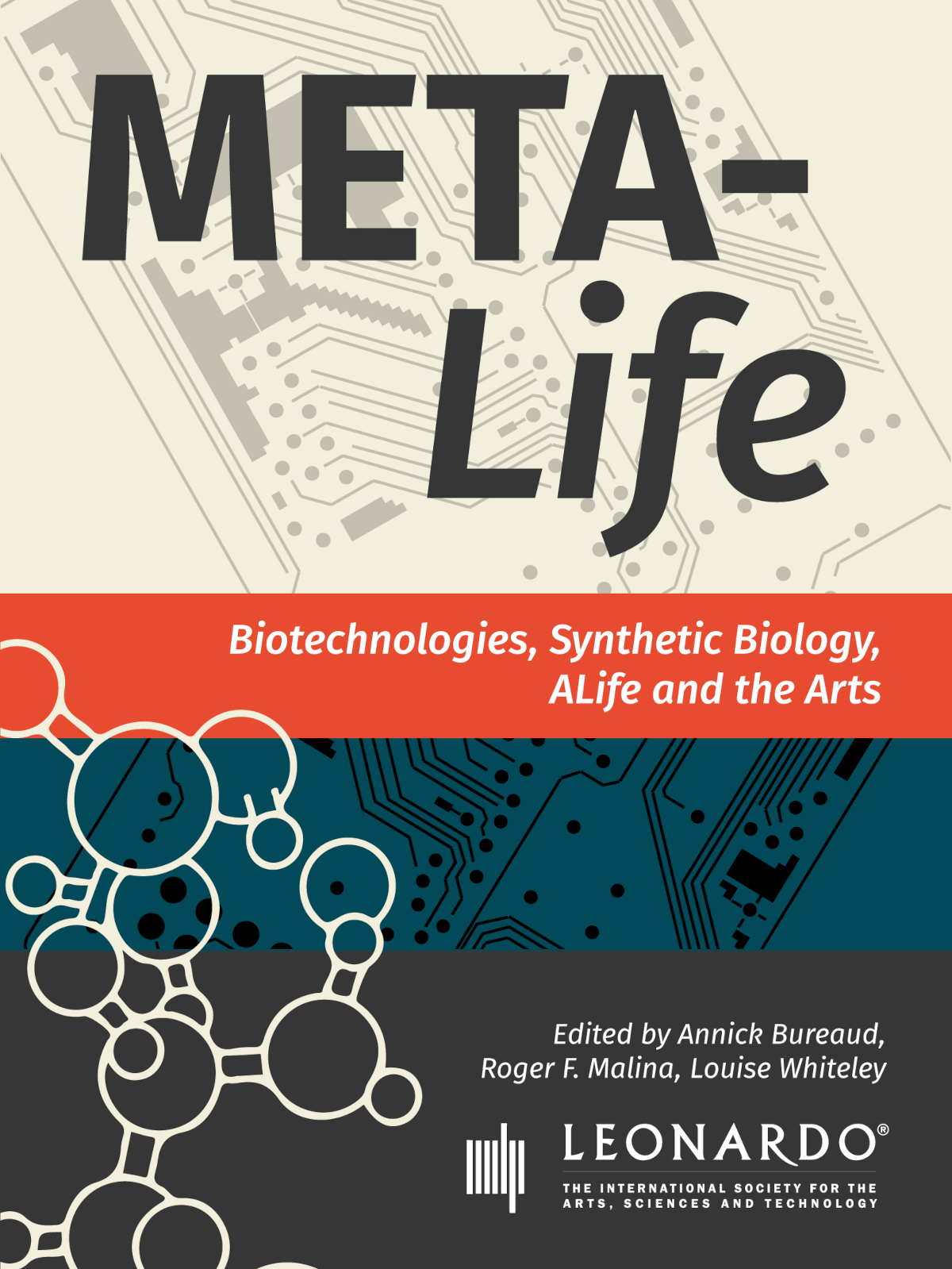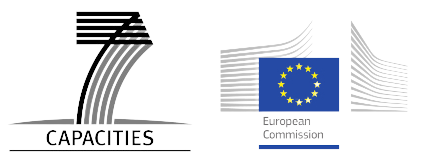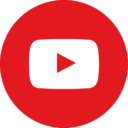
META-LIFE
Annick Bureaud, Roger Malina & Louise Whiteley (Eds.), Leonardo/ISAST, MIT Press, Leonardo ebook series, Kindle Edition, July 2014
Editorial Committee: David Benqué, Annick Bureaud, Oron Catts, Matthew Gardiner, Roger F. Malina, Nell Tenhaaf, Ruth West, Louise Whiteley
45 articles – 694 pages – order eBook
Presentation
An exo-life may not come from outer space hiting the Earth riding a meteorite but very well from the lab, designed by a scientist —unless it is an artist— weaving biology and computing in a petri dish or a bioreactor as a vessel.
With biotechnologies, synthetic biology and Artificial Life, artists have opened new avenues in the artworld, going from still to autonomous objects to living creatures, exploring the thin border between animate and inanimate, confronting the grown, the evolved, the born and the built, raising aesthetical but also social, political and ethical issues.
In this ground breaking collection, the editors have commission new original essays by key figures in these fields and collected over 40 articles previously published in the Leonardo Journal that document the ideas and practice of artists involved in these areas as well as theoreticians and historians.
Chapters include: Between Bio, Silico and Synthetic: Of Life and Arts; Artificial Life and the Arts; Bioart; Bio-Fiction, Design, Architecture; DIY Biology-Biohacking (see below for full Table of Contents).
A web companion to this e-book is available at: http://synthbioart.texashats.org
The Meta-Life e-book is a project by Leonardo/Olats as an outcome of the European Studiolab Project, supported by the European Commission Seventh Framework Programme, in partnership with Leonardo/ISAST and MIT Press and in collaboration with ATEC at the University of Texas at Dallas.
Table of contents
Preface, Roger Malina, Meta-Life: « Aha » Moments That Drive Art-Science
Introduction, Annick Bureaud, « Art at the Future Tense »
1 – Between Bio, Silico and Synthetic: of Life and Arts
– Nell Tenhaaf, « “Trust Regions” for Art/Sci », 2014
– Oron Catts & Ionat Zurr, « Countering the Engineering Mindset: The Conflict of Art and Synthetic Biology », 2014
– Amy M. Youngs, « The Fine Art of Creating Life », 2000
– Michael John Gorman, « The Sweet Smell of Synthetic Biology, GROW YOUR OWN… Life After Nature, at Science Gallery », 2014
– Matthew Gardiner & Al. « Project Genesis: Ars Electronica« , 2014
2 – Artificial Life and the Arts
2.1 – ALife – At the Crossroad of Art, Science and Philosophy
– Nell Tenhaaf, « As Art Is Lifelike: Evolution, Art, and the Readymade », 1998
– Edward A. Shanken, “Life as We Know It and/or Life as It Could Be: Epistemology and the Ontology/Ontogeny of Artificial Life », 1998
– Kenneth E. Rinaldo, “Technology Recapitulates Phylogeny: Artificial Life Art”, 1998
– Ursula Huws, “Nature, Technology and Art: The Emergence of a New Relationship?”, 2000
– Mark Bedau, “The Scientific and Philosophical Scope of Artificial Life”, 2002
– Alvaro Moreno, “Artificial Life and Philosophy”, 2002
2.2 – ALife – Artworks
– Sommerer Christa, Mignonneau Laurent, “Art as a Living System: Interactive Computer Artworks”, 1999
– Ray Thomas S., « Aesthetically Evolved Virtual Pets », 2001
– Jane Prophet, “Sublime Ecologies and Artistic Endeavors: Artificial Life and Interactivity in the Online Project TechnoSphere”, 1996
– Bruce Damer, “The Cyberbiological Worlds of Nerve Garden: A Test Bed for VRML 2.0”, 1998
– Kusahara Machiko, « The Art of Creating Subjective Reality: An Analysis of Japanese Digital Pets », 2001
– Anna Dumitriu and Blay Whitby, “Cybernetic Bacteria 2..0″, 2011
– Nell Tenhaaf, « Art Embodies A-Life: The VIDA Competition », 2008
3 – BioArt
3.1 – BioArt – Creating with Living Matter
– Adam Zaretsky, « Viva Vivo! Living Art Is Dead”, 2004
– Steve Tomasula, “Genetic Art and the Aesthetics of Biology”, 2002
– George Gessert, “Bastard Flowers”, 1996
– Suzanne Anker, “Gene Culture: Molecular Metaphor in Visual Art”, 2000
3.2 – BioArt – Creations
– George Gessert, “Notes on Genetic Art”, 1993
– Eduardo Kac, “GFP Bunny”, 2003
– Marta de Menezes, “The Artificial Natural: Manipulating Butterfly Wing Patterns for Artistic Purposes”, 2003
– Catts Oron, Zurr Ionat, « Growing Semi-Living Sculptures: The Tissue Culture & Art Project », 2002
– Catts Oron, « Not Moving – Living », 2014
– Tagny Duff, Jill Muhling, Maria Grade Godinho and Stuart Hodgetts, “How to Make Living Viral Tattoos”, 2011
– Patricia Noronha, “Yeast Biopaintings: Biofilms as an Artistic Instrument”, 2011
– Polona Tratnik, “37°C: From the inside of a Being to the Thin Line of Life”, 2005
– Zurr Ionat, « The Animation of Lab-Grown Life: Tissue Engineered Muscle Actuator (TEMA) », 2014
– Julie Clarke, “Corporeal Mélange: Aesthetics and Ethics of Biomaterials in Stelarc and Nina Sellars’s Blender”, 2006
– Pelling Andrew E., « Re-purposing The Behaviour and Motion of Living Cells in an Anti-Disciplinary and Curiosity-Driven Context », 2014
– Hilton Craig, « The Immortalisation of Billy Apple®: An Art-Science Collaboration », 2014
– Tony Bellaver, “Teaching Nature How to Become Nature: The Woodland Recovery Project”, 1998
4 – Bio – Fiction, Design, Architecture
– Judy Malloy, « OK Research, OK Genetic Engineering, Bad Information: Information Art Describes Technology, 1988
– Tran T. Kim-Trang and Karl Mihail, “Gene Genies Worldwide », 2003
– David Benqué, « Blueprints for the Unknown, Questioning the « Design » of Life », 2014
– Dennis Dollens, “Architecture as Nature: A Biodigital Hypothesis”, 2009
– Bakke Monika, « Living (On) Dust: Around the Globe with Mineral Particles & Microbial Hitchhikers », 2014
5 – DIY Biology – BioHacking
– Morgan Meyer, « Hacking Life? The Politics and Poetics of DIY Biology », 2014
– Alessandro Delfanti, « Is Do-It-Yourself Biology Being Co-Opted by Institutions? », 2014
– Denisa Kera, « Do-It-Yourself biology (DIYbio): Return of the Folly of Empiricism and Living Instruments », 2014
– Nurit Bar Shai, « GenSpace, New York, Art & Science at Genspace, Brooklyn’s Community Biotech Lab », 2014
– Cathal Garvey (interview by David Benqué), 2014
Partenaires / Partners
This project has received support from Studiolab. Studiolab has been funded by the European Commission 7th Framework Program.

Leonardo/Olats
Observatoire Leonardo des Arts et des Techno-Sciences
À propos / About | Lettre d'information Olats News



Pour toute (re)publication, merci de contacter / For any (re)publication, please contact Annick Bureaud: info@olats.org
Pour toute question concernant le site, merci de contacter / For any issue about the website, please contact: webmaster@olats.org
Design Thierry Fournier
© Association Leonardo 1997-2022